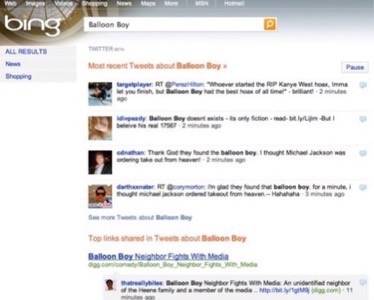Microsoft has just announced at the Web 2.0 Summit that its search engine Bing now includes Twitter search results. Facebook messages posted by people with public profiles will roll out next, at a date to be determined.

Twitter can bring a new level of up-to-the-minute information to web search, but can Bing add value to Twitter search? We asked three User Experience experts for their opinions about what Bing would need to do in order to succeed in this integration from a UX perspective. They agreed that there was exciting potential here but that the implementation was rudimentary.
The new Twitter search is at bing.com/twitter as well as placing some recent messages from celebrities on search results pages when users search for celebrity names. On the /twitter page users will be able to view deduplicated search results listed by timeliness or importance, determined by friend/follow ratios of Twitter users, number of retweets, lengthyness of the text and presence of a link. Users are shown tag clouds of popular topics on Twitter and hot links being shared extensively. This isn’t anything too big but Microsoft says it’s only the beginning.

Bing now has real-time access to the full fire hose of Twitter data, that’s a really valuable flow of data. It’s clear that Twitter can provide some real opportunity for Bing, but what can Bing do for Twitter? Would Twitter users be better off just using Twitter search?
We asked three User Experience professionals for their opinions. They provided feedback as the announcement rolled out, through the Aardvark IM interface. (Which was awesome.)
Ben Thompson, Massachusetts-based financial services UX designer.
“The ability to integrate facebook and twitter streams and data is the next evolutionary step for search. To me it isn’t a game changer like Google was but evolutionary in that real time was always desired. It’s the next step.”
Thompson is excited about potential use cases.
“The integration of the real time stream can bring pertinent information on live events. Say we are watching the next Presidential debate. Now people can search and get real streams from people and their thoughts about it instead of just listening to the pundits. The celebrity angle will allow people to get closer to the direct information from that celebrity instead of just news stories about them. Plus it will allow up-to-the-minute information.”
“I believe Bing can add value to Twitter search by making people more aware of the power of Twitter.” – Ben Thompsan, UX designer
But couldn’t people do that on Twitter by itself? What can Bing do for Twitter?
“I believe Bing can add value to Twitter search by making people more aware of the power of Twitter. Many people think Twitter is just a silly place where people write about themselves in 140 characters – not understanding the true power of Twitter is in massive amounts of real time data. So Bing displaying twitter results will help bring that concept to the masses.”
Thomas Vander Wal, Principal at InfoCloud Solutions.
“I would give Bing/Twitter a 70% good, but not too different from other things. I am wondering how they can or will disambiguate the Paris Hilton type problem (hotel & celebrity). I saw the photos of Carly Fiorina from W2S yesterday and dropped ‘carly’ into bing/twitter, but it did not disambiguate the 4 various ‘carly’s being tweeted about.”
“This new integration does not sound like much of a value add to what Twitter already offers, just mashing it into something else.” -Thomas Vander Wal
Vander Wal is very critical of Bing’s use of tag clouds in Twitter search.
“Tag clouds normally are a large problem for finding and navigating, they work best on distinct objects, e.g. ‘2010 Ford Mustang.’ Top level tag clouds normally work best for the things biggest and boldest, but most people don’t see the other elements. Twitter’s own list view of hot topics is easier for people to grasp. Tag clouds are more cool and fun (for those few that grok them) than helpful – any usability testing normally drops them from consideration for use.”
“This new integration does not sound like much of a value add to what Twitter already offers, just mashing it into something else. The basic level Information Architecture on the Bing Twitter search page is far from clear. The way that retweeting gets gamed I am not sure how valuable that metric is, but if weighted low in an algorithm it could have value.”
“Playing with the site, it does not understand me in context. The ‘most recent tweets about…’ are pulling from the public stream and are not delivering quality results. It’s not taking into account who I am, which means it is not pulling things related on following relationships.”
“I am one of those outliers who deals with heavy information flows. Having something that can not sort through the volume of micro information without adding some contextual relevance is going to be tough for general users.”
“If Bing learns interests to filter by context and interest then there is really something there.”
Nicole Califano, UX Designer at The Barbarian Group in San Francisco.
“This is not a new idea, but the right execution has yet to be seen.” -Nicole Califano
“My first instinct is that there needs to be some really creative user preferences down the line, as this could get messy. This is all very exciting but I’m a little concerned with filtering these channels (so far I think Twitter & Facebook are unsuccessful at filtering).
“No doubt, Google will be integrating Twitter, Facebook and other social outlets to their search soon too. This is not a new idea, but the right execution has yet to be seen.”
Can Bing step up its game with regards to Twitter search? The initial launch isn’t very promising, especially when there are so many small startups doing much more interesting things with search on top of Twitter. At the very least the integration might bring real time into the consciousness of more consumers, though.

















